Premium
Day of suppressed protests across as KDF patrol the streets of Nairobi
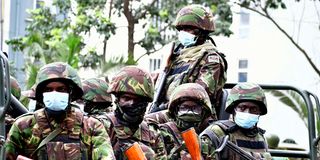
Kenya Defence Forces soldiers patrol along Moi Avenue in Nairobi during the anti-Finance Bill protests on June 27, 2024.
What you need to know:
- KDF soldiers gathered at the Nyayo Stadium from where they embarked on patrols.
- Unlike the police officers, the military personnel did not engage civilians in any way.
Whereas the country recorded protests across its width and breadth on Thursday, it was not as intense as Tuesday’s demonstrations that climaxed with the storming of Parliament Buildings by hundreds of youths after MPs passed the Finance Bill, 2024.
There was a heavy presence of military personnel in the streets of Nairobi in efforts to assist the police in handling protesters.
Their presence came after the gazettement of their deployment by Defence Cabinet Secretary Aden Duale on Tuesday night.
By early Thursday morning, police had mounted roadblocks along State House Road, Mamlaka Road, University Way roundabout, and Arboretum Road where a thorough search was conducted on motorists.
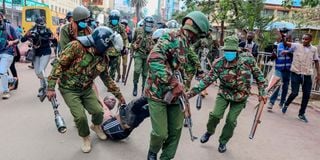
Police officers arrest a protester along Moi Avenue in Nairobi during anti-Finance Bill protests on June 27, 2024.
Kenya Defence Forces (KDF) soldiers gathered at the Nyayo National Stadium from where they embarked on patrols.
Unlike their police counterparts who fired numerous tear gas canisters around the city to disperse the protesters, the soldiers did not engage civilians in any way.
At some point, youthful protesters waved and even hung on the military vehicles while chanting anti-tax slogans.
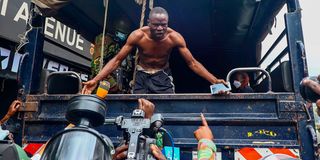
A protester argues with police officers after being arrested during the anti-Finance Bill protests in Nairobi on June 27, 2024.
All roads leading to Parliament Buildings were blocked using police trucks and water cannons. Soldiers were also deployed there.
In Eldoret, military tanks were spotted heading towards Rupa Mall but later left.
Tension remained high in the town that is President William Ruto’s backyard as a group of youth armed with wooden batons and other weapons roamed the streets roughing up bystanders who attempted to record their activities.
The more than 300 youth converged at the county headquarters before patrolling the streets, clearing debris from Tuesday’s chaotic anti-Finance Bill protests.
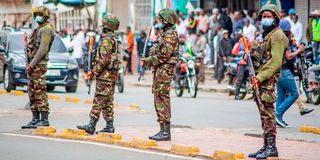
Kenya Defence Force soldiers stand guard along Muindi Mbingu Street in Nairobi during Anti-Finance Bill protests on June 27, 2024.
Traders hurriedly shuttered their shops over fears of a repeat of the widespread looting that took place on Tuesday .
The patrolling youths later assembled at the county headquarters where they held a meeting as anti-riot police officers watched from a distance.
A reinforcement of two lorries of military personnel arrived at the county grounds but left after realising that the youths were peaceful.
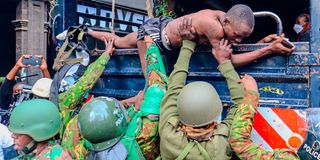
A Protester is forced into a police lorry after being arrested during the anti-Finance Bill protests in Nairobi on June 27, 2024.
A huge number of anti-riot police officers in full gear were seen camping near Zion Mall on Ronald Ngala Street, the epicenter of Tuesday's protests.
The situation was the same along Odinga Oginga Street towards Iten Road near the High Court, Uganda Road, and the Eldoret-Kapsabet highway.
In Kisumu, the protests saw a low turnout. At around 11.30am, police lobbed tear gas canisters at the demonstrators at the Patel Flats round-about, dispersing them, but they re-grouped and marched to the city centre using the Kisumu-Kakamega highway.
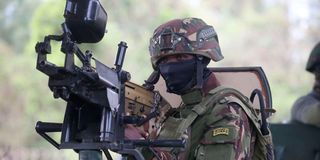
Kenya Defence Forces on patrol in Nairobi's Central Business District during the anti-Finance Bill protests on June 27, 2024.
When they managed to reach the Kisumu State Lodge, the protesters came face to face with an armoured personnel carrier at the highly guarded facility.
Tuesday's protests left a trail of destruction across the country with throngs of angry youths chanting anti-tax slogans while engaging police in running battles, looting, and destroying property.
Chaotic scenes were witnessed in towns and cities across the country, with the sounds of gunshots, exploding tear gas cannisters, as well as sights of dense fumes, bonfires, and shouts characterising the better part of Tuesday.
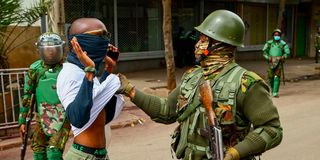
A youth surrenders after being cornered by anti-riot police officers along Moi Avenue, Nairobi during the anti-Finance Bill protests on June 27, 2024.
Tuesday evening’s announcement by the President’s refusal to ascend to the Finance Bill, however, appears to have thrown protestors in the country off balance with the numbers witnessed on the streets yesterday being greatly reduced.
The deployment of the military officers in the country on Tuesday was however criticised by some leaders including, Saboti MP Caleb Amisi, a member of the National Assembly Defence and Foreign Relations Committee.
In his diatribe to the move on his X platform Tuesday evening, the legislator urged the military officers to “not allow themselves to be used to shoot Kenyans in the streets.
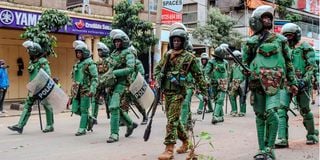
Anti-riot police officers on patrol along Moi Avenue, Nairobi during anti-Finance Bill protests on June 27, 2024.
“It is a democracy, not a military rule,” he said.
Former Defence Cabinet Secretary, Eugene Wamalwa condemned the deployment of the military to Nairobi and said it was unconstitutional because due procedure for their involvement in the protests had not been followed.
In Mombasa, litigants and court users were left in limbo after police stopped operations at the Law Courts on Thursday citing security reasons amidst nationwide protests against the Finance Bill 2024/2025.
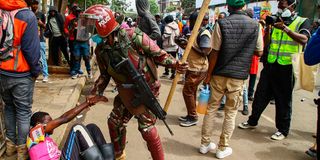
A protester is arrested by a police officers along Kenyatta Avenue, Nairobi during the anti-Finance Bill protests on June 27, 2024
There was heavy police presence guarding critical government facilities in the town after protesters had on Tuesday made an attempt to raid the Mombasa State House and the Central Police Station while vandalising the Huduma Centre and a section of the civil registry offices at the Bima Towers.
In the streets, a peaceful protest organised to commemorate Kenyans who lost their lives in the nationwide demonstrations was disrupted after rowdy youth infiltrated the crowd. The unruly group engaged in vandalism and mugging.
Several businesses were forced to close early for fear of more attacks towards the evening.
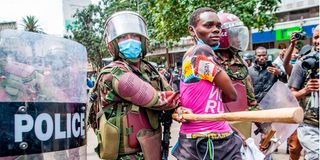
A protester is arrested by police officers along Kenyatta Avenue in Nairobi during the anti-Finance Bill protests on June 27th 2024.
In Kilifi County, a group of protesters attempted to storm the homes of Ganze Member of Parliament Kenneth Kazungu and his Kilifi North counterpart Owen Baya while throwing stones at police officers.
Kilifi County Police Commander Ms Fatuma Hadi led the police to disperse the youth.
The protesters engaged the police in a running battle throughout the day as they barricaded the Kilifi-Malindi highway and other roads in the suburbs of Kilifi town with bonfires and stones.
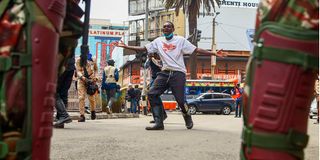
A protester confronts anti-riot police officers along Kenyatta Avenue in Nairobi during the anti-Finance Bill protests on June 27, 2024.
Both uniformed and ununiformed police officers in several instances, in clips captured, are seen arresting Kenyans on the streets of Nairobi and hauling them in a white lorry without a registration number.
The lorry whose number plates were visibly concealed roamed the streets of the capital picking some of the arrested protesters.
The Nation could not immediately verify the number of arrested individuals. But on social media, many Kenyans raised the concerns and sounded distress alarms over the new phenomenon.
Reporting by Brian Ocharo, Valentine Obara, Karim Rajan, Jurgen Nambeka, Maureen Ongala, Barnabas Bii, Titus Ominde, Mercy Simiyu, Daniel Ogetta





